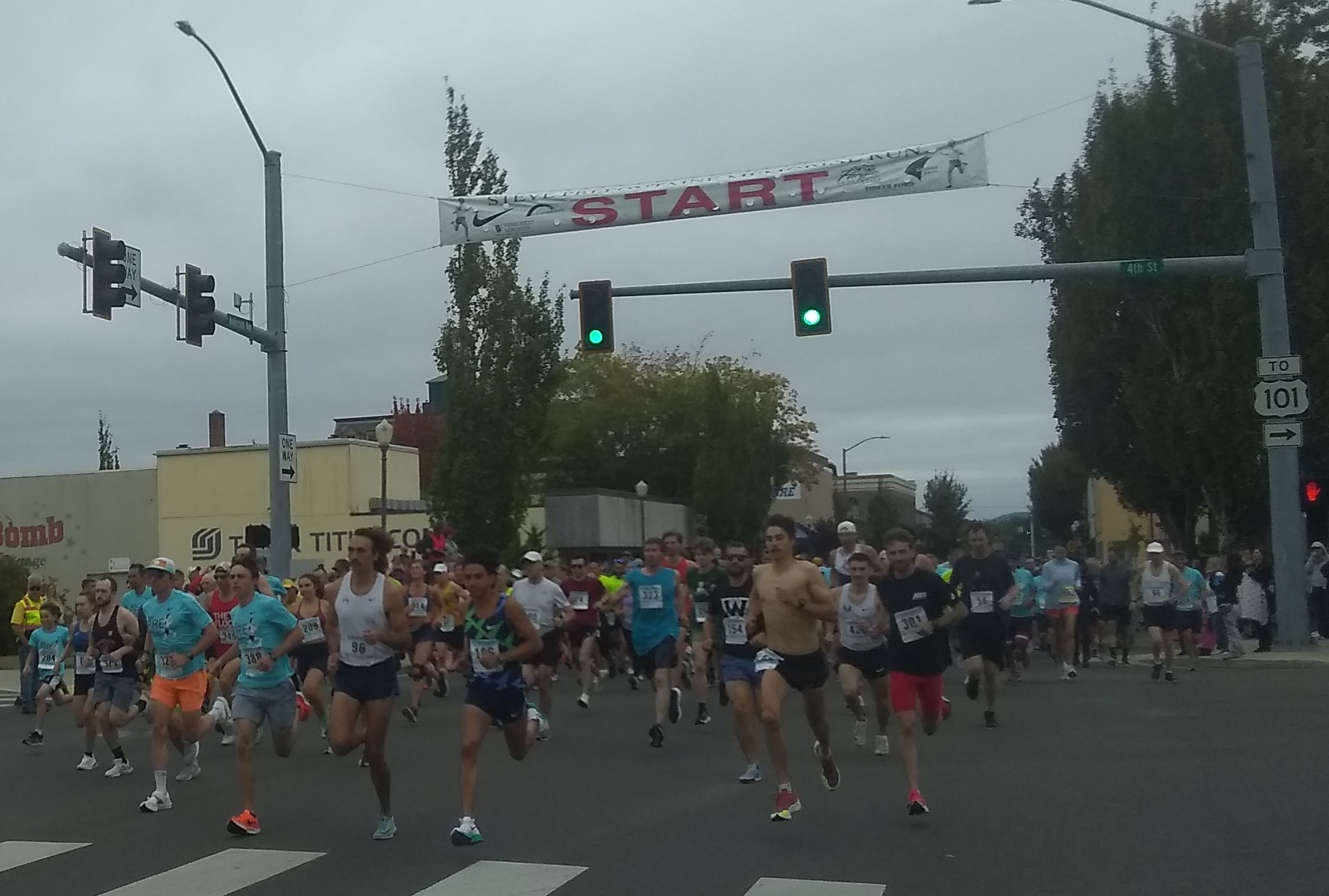Prefontaine Memorial Run
Hundreds of spectators gathered around the starting line of the 42nd annual Prefontaine Run in Coos Bay, Oregon. It was a Saturday morning in September. Drizzle fell.
I left Portland at five-thirty in the morning to witness the event. I wanted to see for myself if Steve Prefontaine’s legend still wielded significant magic, and if there was something new to his incredible story that’d I missed or hadn’t yet imagined. And I wanted to determine if Pre’s metaphor still ran strong for me and, perhaps Oregon.
By the time I’d arrived, the high school and college cross country teams had already started ten minutes earlier. A couple hundred competitors were stretching and adjusting their high tech watches and cameras mounted on their heads. I noticed about a dozen older men wearing singlets that read Men of Oregon Club.
What does it mean to be a man of Oregon today? Does the question even matter?
Two drones hovered overhead. A DJ played music, including a track from Boston’s debut album. It staggered me to realize that Pre was dead before that record hit the charts. He was also gone before disco’s heyday.
I waited five minutes for the 10k race to begin and surveyed downtown Coos Bay, once one of the richest cities in Oregon, and a county that voted for George McGovern over Richard Nixon in the 1972 Presidential election. George McGovern! In rural Oregon! Only one reason for that: unions.
Downtown Coos Bay felt grim. Boarded up apartments and businesses. Stores hanging on by a cobweb. Could it ever rally?
Almost everyone I saw appeared happy. They were out on the street participating in something positive. Running! They were making their own culture, not consuming it.
One dude stood out: a Jesus look a-like sporting a mustache identical to the won Pre wore at the 1972 Olympics when he inexplicably went against his spirit and held back in the race. He should have run the blood-doping Europeans into the ground. Why Pre didn’t is an enduring mystery of Oregon’s sporting history.
I also saw three homeless men in their 70s camped along the route. Chances were they hailed from Coos Bay. They might have known Pre in his youth, partied with him. They might have been loggers or fishermen or drywallers. Now they were splayed on sidewalks but they still chose a choice spot to see the race. Think about that choice.
The music stopped. An official broadcast information about the course. She called out the names of two men who had run the previous 41 races. She introduced Pre’s sister, Linda, who held up a starter’s gun, then fired it.
Cheers abounded and the runners took off.
Watching it all, I felt happier than I had in a long time. Watching people of all ages run can do that to a person. There is nothing more sublime and thought provoking than running. You’re in your head even if you’re listening to music. It’s even better when you run with dogs on a socialist Oregon ocean beach.
I wandered around Coos Bay and then walked to Marshfield High School, Pre’s alma mater. All racers crossed the finish line on the track where Pre introduced himself to the track and field world 55 years ago.
On my walk, I saw a dozen parked cars and RVs that were housing people. I saw several more homeless men. I also noticed men and women with visible meth scars. Some were walking to the school, perhaps to see their children finish the race, perhaps hoping meth skipped a generation.
School busses from Washington, California and Oregon filled the side streets leading to the school. Where is Pre’s story landing with these youth? They are here, in his hometown, running.
I made my way inside the stadium and it was packed with spectators. The high school and college teams were hanging out, goofing around, cheering, clapping. I watched the winner of the open event cross the finish line. It was the Jesus dude and he burned up the last hundred yards with a ferocious kick! It was all pretty damn exciting and made me want to take a jog right then and there.
Where does a competitive run like this, created by Pre’s legacy, take us? Into the past or forward? When you run, you feel free, jaunty, hopeful, a believer, unless you are running from something. But even that means you are on the move. Got to move.

